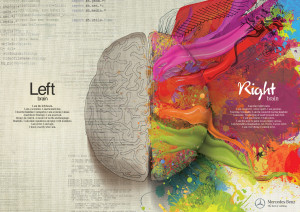
Mercedes Benz: Left Brain - Right Brain, Paint
We are surrounded by beautiful things, amazing perspectives and bold creativity. It's easy to feel intimidated by the sheer wealth talent that exists.
Having not viewed myself as a "creative" person for much of my life, I'm always interested in maximising my creativity.
I came across this article on Oprah.com (*cringe*) that includes some fun tactics to tap into the right side (the creative one) of your brain.
Re-blogged from: http://www.oprah.com/spirit/How-to-Tap-into-the-Right-Side-of-Your-Brain-Martha-Beck-Advice/3#ixzz2PqZtLHxg
Deep practice is hard. It makes your brain feel like a piece of raw hamburger. It's also weirdly rewarding, dropping you into rapt concentration, yielding quick improvement, and (if you're lucky) producing good work. Here are some tricks you can deep practice to buff up your right hemisphere.
1. Sign your name every which way. My favorite teacher and artist, Will Reimann, was brilliant at getting his students to use the right side of their brains. There were many squinty eyes in Reimann's studio, much neural myelination. Here's one of his exercises:
Sign your name.
Done?
Okay, now things get gnarly. Sign again, but this time, do it in mirror writing—right to left, rather than left to right (just moving your hand backward fires the right brain hemisphere). Got that? Now sign upside down. Then backward and upside down. Repeat this until you can sign in all directions. Good luck.
2. Have a bilateral conversation. For this exercise, take a pencil in your right hand (even if you're left-handed) and write the question: "How's it going?" Then switch to your left hand, and write whatever pops up. Your nondominant hand's writing will be shaky—that's okay. The important thing isn't tidiness; it's noticing that your twin hemispheres have different personalities.
The right side of the brain, which controls the left hand, will say things you don't know that you know. It specializes in assessing your physical and mental feelings, and it often offers solutions. "Take a nap," your right hemisphere might say, or "Just do what feels right; we'll be fine." You'll find there's a little Zen master in that left hand of yours (not surprisingly, left-handed people are disproportionately represented in creative professions).
3. Learn new moves. You need your right hemisphere to move in an unfamiliar way, whether you're learning a complicated dance step or holding a new yoga posture. Or cutting your own hair (actually, don't—I speak from experience).
Try this: Walk a few steps, noticing how your arms swing opposite your legs. Now walk with your right arm and right foot going forward simultaneously, then the left hand and left foot. Is this difficult? No? Then do it backward, with your eyes closed—any variation that's initially hard but ultimately learnable. You'll master a new skill, sure; more important, you'll build your overall right-brain facility.
4. Toss in the kitchen sink. Time to push your newly awakened right hemisphere into useful service. Think of a problem that's had you stumped for a while: Your preschooler won't nap, you can't make yourself exercise, you need to cut expenses without sacrificing quality of life. With this challenge in your mind, read a few paragraphs in several totally unrelated books. Then relax. Play with your cat, wash the dishes, watch the neighbors through binoculars. Think of the problem periodically, then drop it again.
This process encourages eureka epiphanies, like those moments in TV dramas where the brilliant doctor or sleuth gets the "ping" of insight that solves the case. Your first few ideas may not be perfect—many will be awful—but there are more where they came from. Once you begin encouraging the right brain to churn out solutions, it will do so more and more abundantly.
For example, Laura wanted to travel but hated kenneling her yellow Lab, Buster. She also had partial hearing loss due to meningitis. One day when she had trouble hearing a flight attendant—ping!—she realized she could train Buster as a hearing service dog. Now they fly the skies in style together.
Dieting made Betsy feel grumpy, bored, and isolated. She and her friend Janet began e-mailing each other for support, then—ping!—decided to create a blog (bitchyourselfthin.com) where dieters could gather to share food fantasies and grumpy harangues. Now Betsy has her ideal body and an Internet community.
Brenda was unnerved by an ex-boyfriend's increasingly paranoid, angry phone messages. Then she realized—ping!—that his very paranoia could shut him down. She had three private detectives ask him about his phone messages; he became convinced she was having him followed, and he disappeared.
All of these women puzzled about a difficult situation, tried many solutions that didn't work, let the problem go, and got a brilliant response from their own creativity. They couldn't force that to happen, but they made it highly likely with Kitchen Sink thinking.
Turning on your right brain is a skill, one that grows steadily stronger the more you work at it. Trigger the sensation of deep practice by mastering any unfamiliar task, feed challenges and stray information into your right brain's database, and see new ideas begin to emerge. As they do, you'll move more confidently and productively through an increasingly complex world. When I see you out Rollerblading, eyes locked in a vacant yet squinty stare, I'll know you're getting the hang of it.
The author Martha Beck is the author of six books, including Steering by Starlight (Rodale).
 Now, I’m a big believer in social media. I love what it does for our connections as people, as businesses and as a global community. It breaks down barriers across all elements of society.
Now, I’m a big believer in social media. I love what it does for our connections as people, as businesses and as a global community. It breaks down barriers across all elements of society. In the lead-up to the Australian federal election (it’s being held on September 7, if you missed the news) I expected some underhanded tactics, spin and impartial reporting. I just didn’t expect it on the front of one of Australia’s leading daily newspapers.
In the lead-up to the Australian federal election (it’s being held on September 7, if you missed the news) I expected some underhanded tactics, spin and impartial reporting. I just didn’t expect it on the front of one of Australia’s leading daily newspapers.